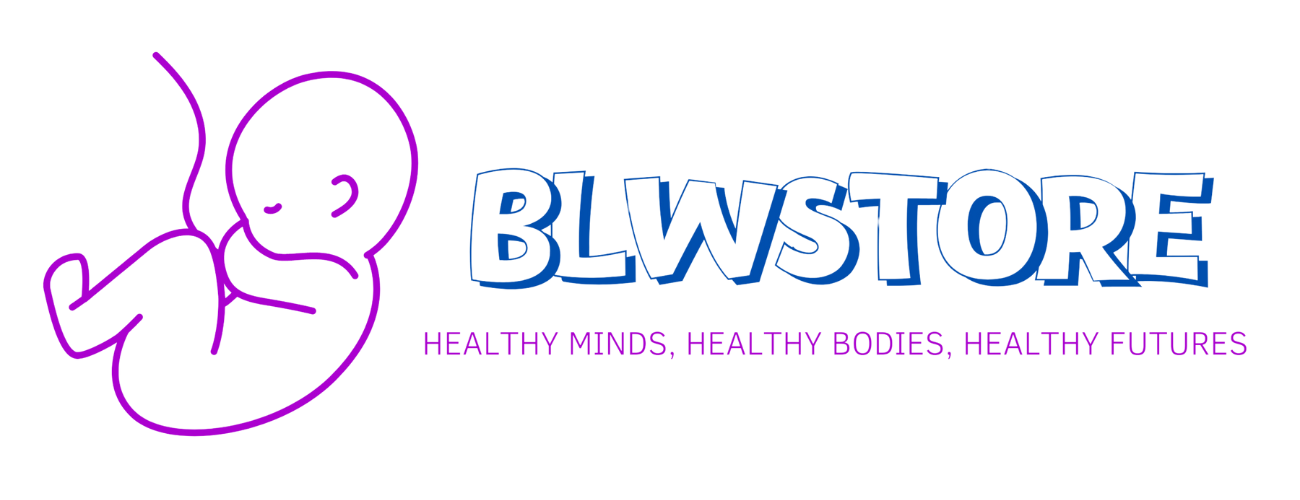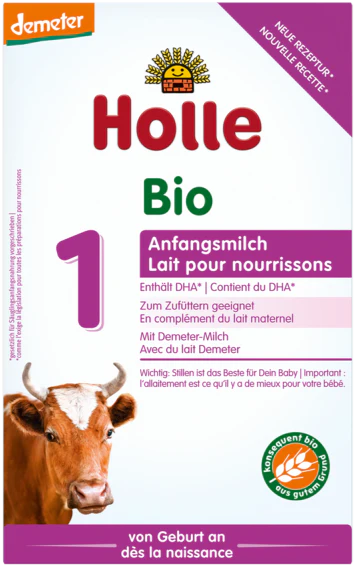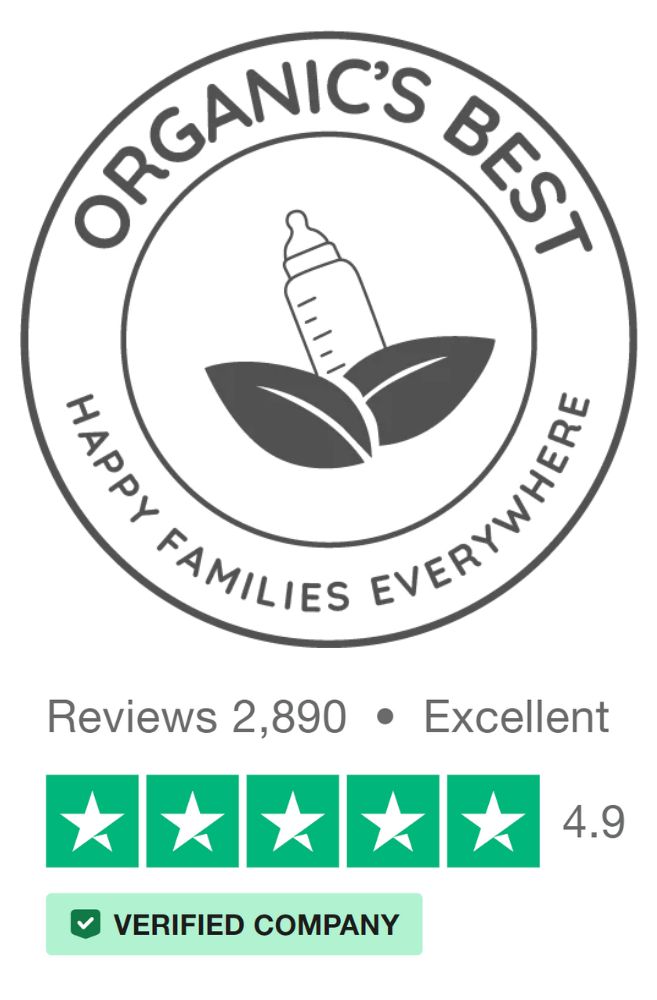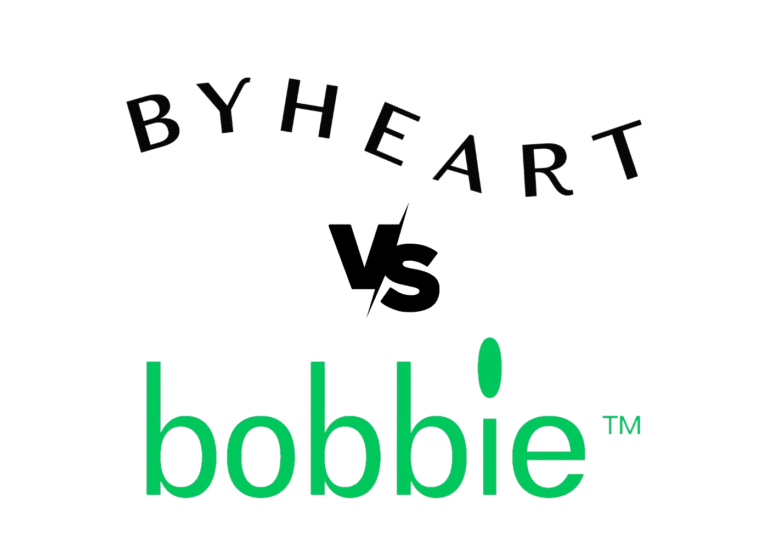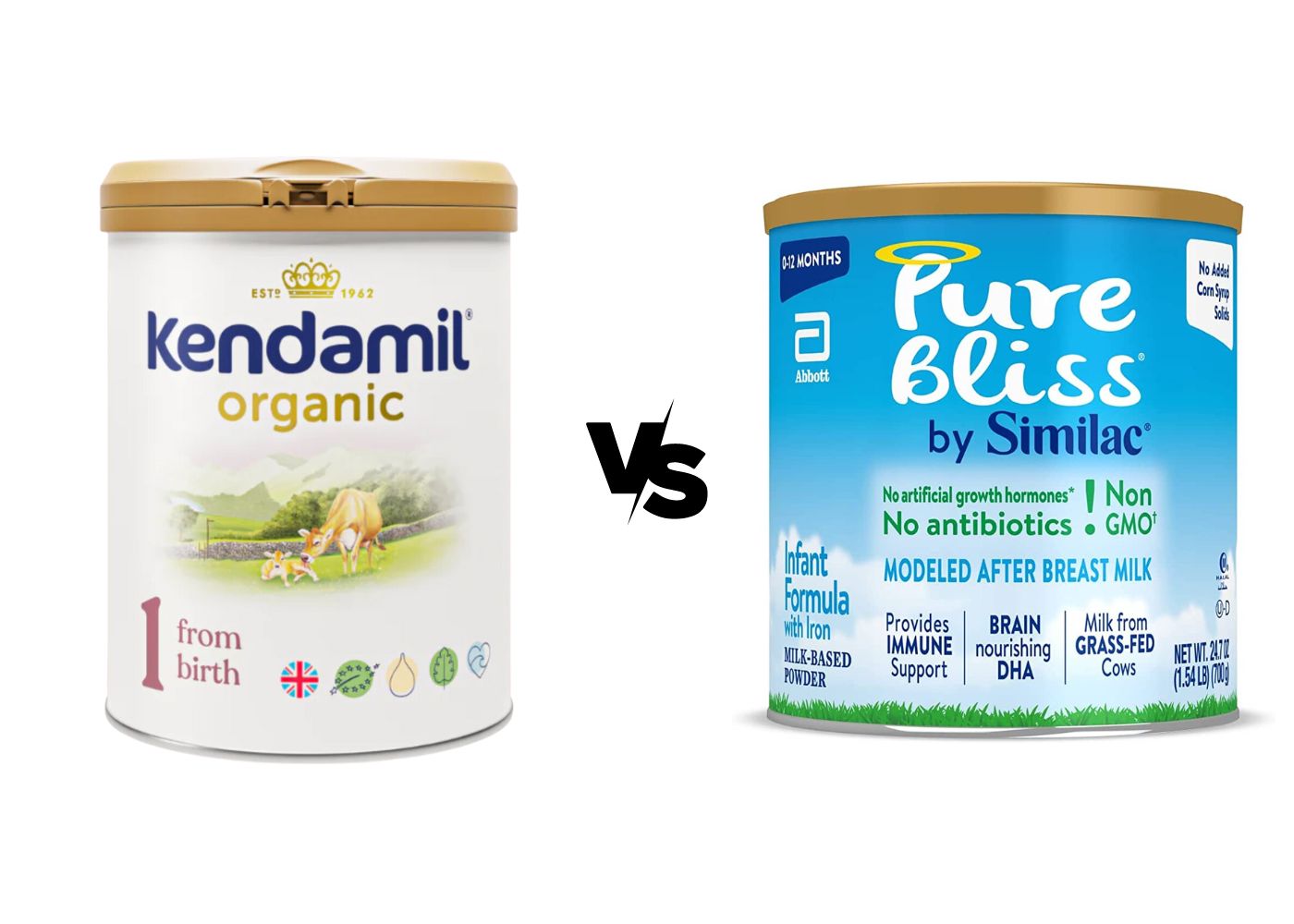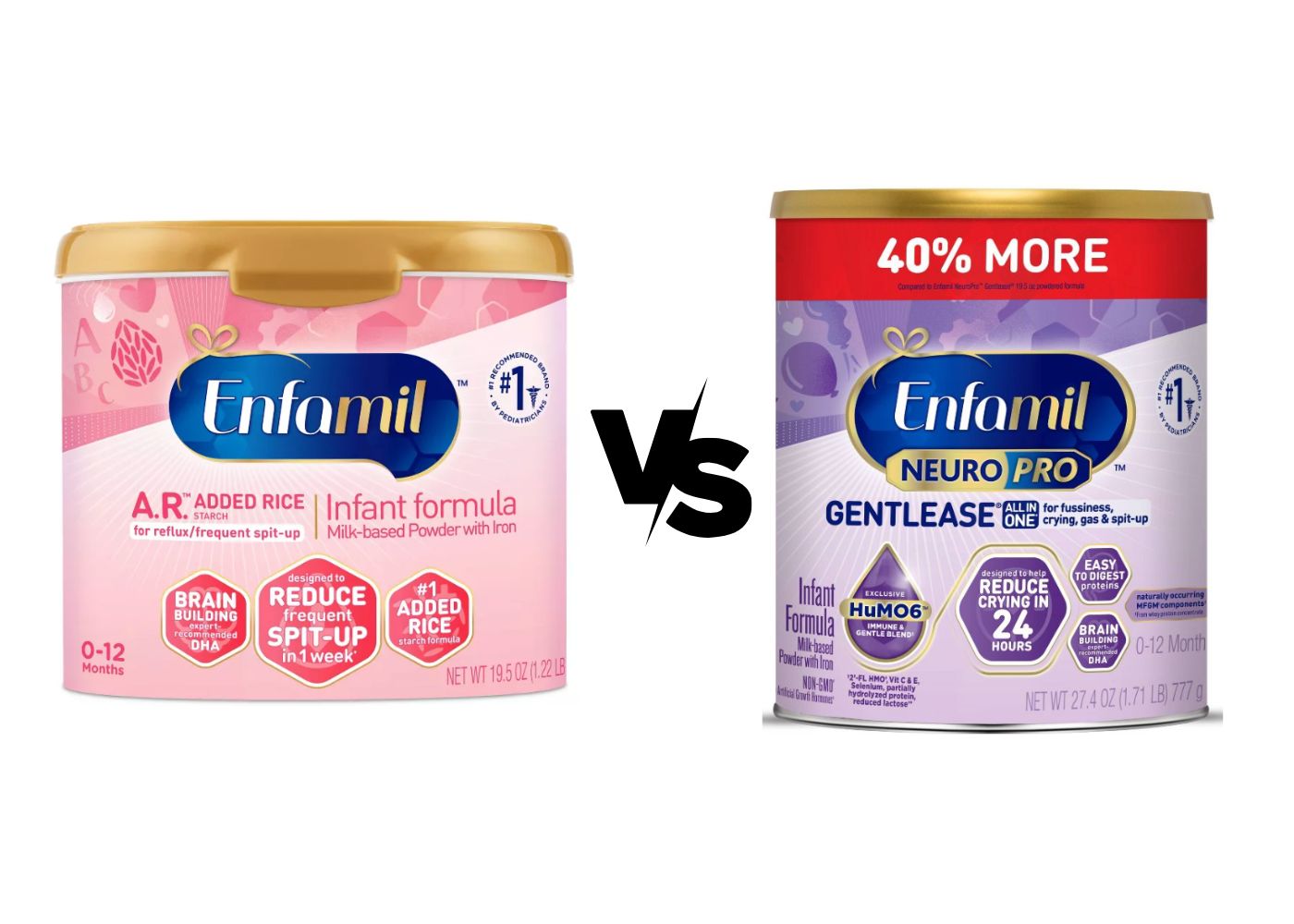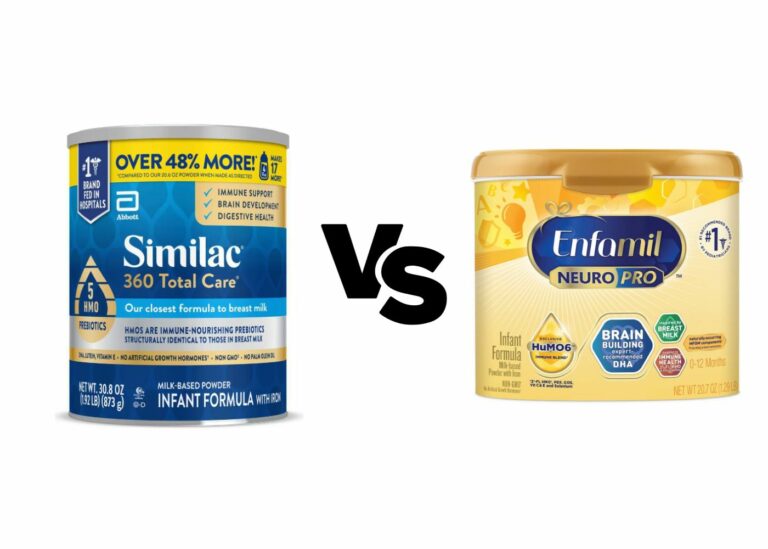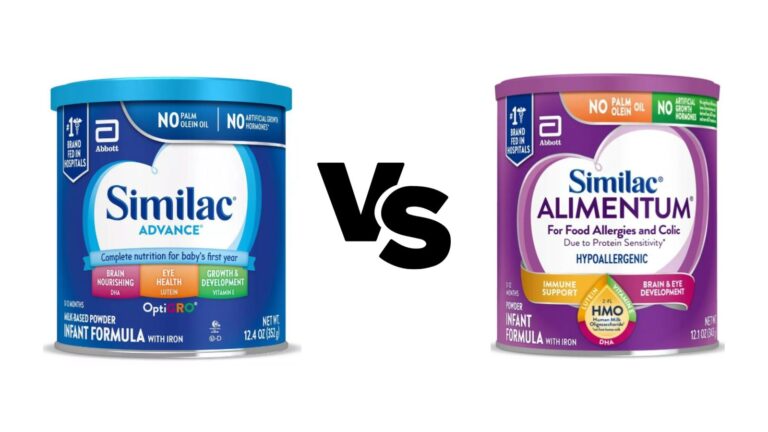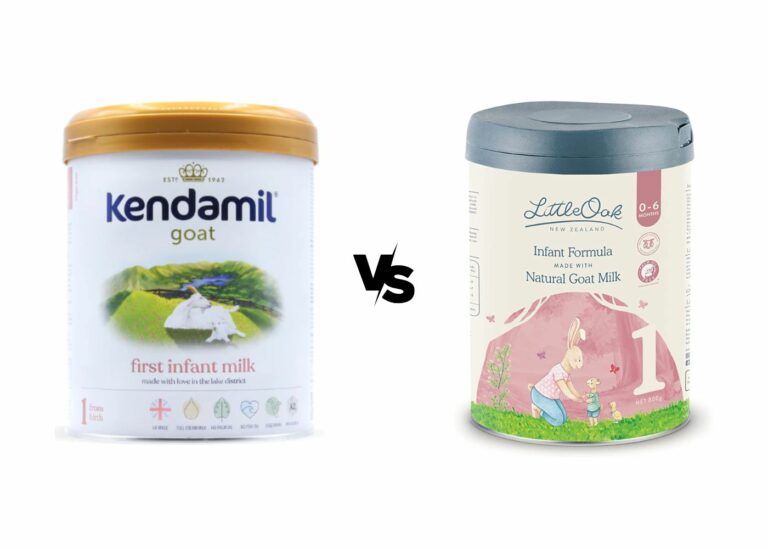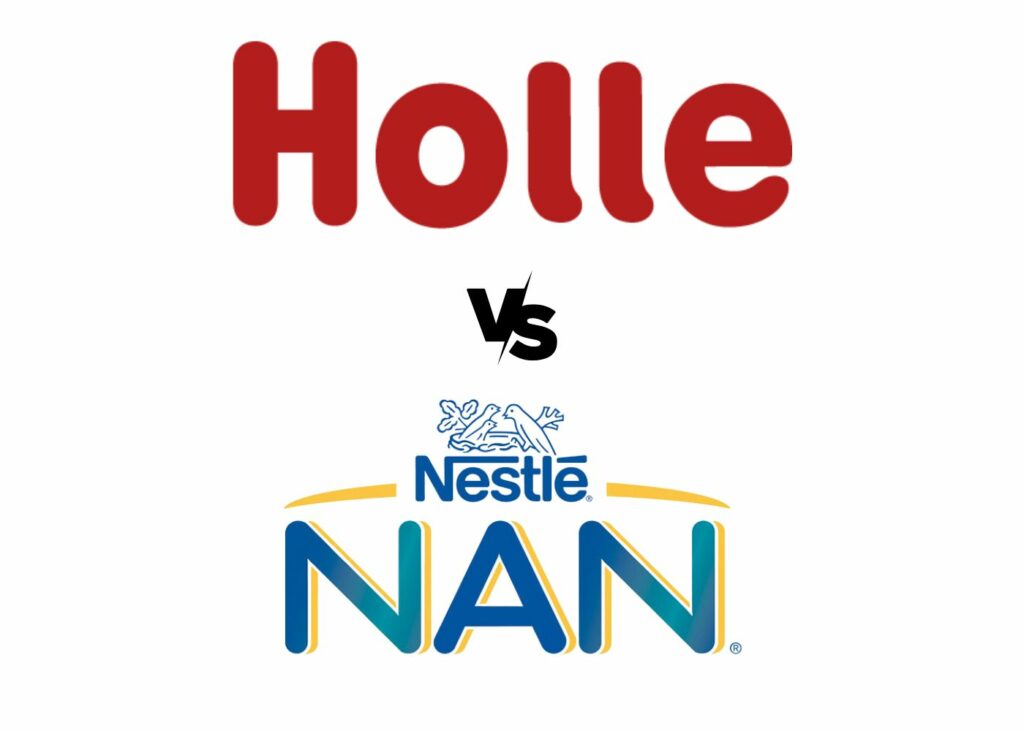
Key Differences Between Holle and NAN
| Key Differences | Holle | Nan |
|---|---|---|
| Origin | European (Germany) | Global brand under Nestle |
| Farming Practices | Demeter-certified organic farms, biodynamic farming practices | Standard non-organic farming |
| Brand Reputation | High organic standards, focus on natural digestion, trusted through consistent commitment | Scientific approach to infant nutrition, strives to meet global standards, strong following worldwide |
| Milk Source | Organic skimmed milk and whey powder | Non-organic whey protein concentrate and nonfat dry milk |
| Protein Content | 1.3g per 100ml | 1.4g per 100ml |
| Unique Protein Feature | Complete profile of essential amino acids, similar to breast milk | Non-organic proteins, similar whey:casein ratio to mature breast milk |
| Carbohydrate Content | Organic lactose, 7.8g per 100ml | Lactose and corn maltodextrin, 7.8g per 100ml |
| Carbohydrate Benefits | Supports healthy digestion and provides energy, organic source | Supports healthy digestion and provides energy, includes non-organic corn maltodextrin |
| Fats and Oils | Organic blend of vegetable oils (palm oil, sunflower oil, and rapeseed oil), organic lactose, and essential fatty acids, DHA and ARA included | Blend of non-organic vegetable oils (palm olein, soy, coconut, high oleic safflower or high-oleic sunflower), DHA included |
| Omega Fatty Acids | DHA and ARA | DHA |
| Prebiotics and Probiotics | No added prebiotics or probiotics, focus on minimal ingredients | Includes probiotic L. reuteri and prebiotic 2′-FL HMO |
| Cost and Availability | Pricier due to high-quality organic ingredients, mainly available online | More affordable, widely available in local stores worldwide |
Blwstore is supported by its audience. When you buy through links on our site, we may earn an affiliate commission.
Feeding your baby is one of the most important and personal decisions a parent can make.
We want the best for our babies, but the world of nutrition is not an easy one to navigate.
This article aims to help you make an informed decision by comparing two leading brands in the baby formula industry, Holle and Nan.
Our primary comparison will focus on the Holle Pre and Nan 1 Pro formulas, which are designed for 0-6 month old babies and 0-12 months in Nan’s case.
However, this comparison can still be applied to their follow-on formulas because they maintain similar ingredient profiles and nutritional values.
Let’s get after it!
Our Short Answer
For us, this comparison was an easy decision: our recommendation leans towards Holle.
Its organic practices, combined with a minimalistic ingredient list, gives it an edge over Nan.
However, don’t rule out Nan completely, especially if your baby requires prebiotics or probiotics. It’s also more readily available in stores, while Holle usually requires an online purchase, at least in the US.
Holle stands out for its organic and natural ingredients.
- Demeter Certified: The highest organic standard in Europe, ensuring biodynamic, chemical-free farming.
- Nutrient-rich: Packed with essential vitamins (A, D, E), minerals, and fatty acids (DHA & ARA).
- Pure & Simple: Free from artificial sweeteners, GMOs, chemicals, hormones, gluten, and soy.
- Organic Lactose & Milk Fats: Mimics natural breast milk carbohydrates.
At BLWStore, we may earn a commission from some of the products featured on our website through affiliate partnerships with retailers. We want to be transparent with our readers and let you know that we do not receive any products for special consideration. The commission we earn helps support our website and allows us to continue providing helpful information and product recommendations. Thank you for your support!
Brand Reputation
When choosing a baby formula, the brand’s reputation, philosophy, and commitment to quality are just as important as the ingredients in the can.
In this section, we will delve into the backgrounds of Holle and Nan (a Nestle brand), shedding light on their philosophies, quality standards, and the trust they’ve earned from parents worldwide.
Holle: premium organic baby food with Demeter certification for biodynamic farming, focus on high-quality nutrition and natural digestion, built trust through consistent commitment.
NAN (Nestle): leading player in the infant formula market, scientific approach to infant nutrition, strives to meet global standards, strong following worldwide, particularly in Latin America.
Holle Reputation
Holle has a long-standing reputation for producing premium organic baby food. With almost a century of experience, they’ve always focused on providing the highest quality nutrition for babies and toddlers. Their philosophy is simple and powerful—nature is the best producer.
Holle’s commitment to organic, biodynamic farming is evident in their Demeter certification, the highest organic certification in Europe.
This means their formula ingredients come from farms that prioritize environmental sustainability, animal welfare, and chemical-free agricultural practices.
Holle Pre infant formula, suitable from birth up to 6 months of age, is designed to nourish your baby’s natural digestion while providing a complete source of nutrition.
The trust in Holle’s name has been built on their consistent commitment to these principles.
NAN (Nestle) Reputation
Nan, a brand under the global conglomerate Nestle, is a leading player in the infant formula market.
Known for their scientific approach to infant nutrition, Nan prides itself on developing formulas close to breast milk’s composition.
They aim to give every infant the best start by offering nutritionally complete and scientifically researched products.
Nan’s reputation is built on Nestle’s commitment to quality, safety, and excellence in infant nutrition research.
They have a strong scientific foundation and strive to meet global nutritional standards.
This commitment to innovation and quality has earned them a strong following of parents worldwide, particularly in Latin America, where they are the #1 infant formula brand.
Nutritional Composition
Holle Pre uses organic skimmed milk and whey powder, organic lactose, and organic palm oil, providing a healthier and safer option for infants while supporting sustainable and ethical practices.
Nan 1 Pro uses non-organic ingredients, which may have negative health and environmental consequences.
Protein Content
Proteins are fundamental for growth, body repair, and immune function in babies.
The primary protein source in Holle Pre is organic skimmed milk and whey powder. This combination imitates the whey:casein ratio in breast milk, which is easily digestible for infants.
On the other hand, Nan 1 Pro uses a blend of non-organic whey protein concentrate and nonfat dry milk, mimicking as well a whey:casein ratio similar to mature breast milk.
Most important difference is the source of the milk used to manufacture the formula.
Holle uses organic, which in our opinion is the most important factor in baby nutrition.
Carbohydrate Content
Carbohydrates provide essential energy for your baby’s growth and brain development.
The main carbohydrate in Holle Pre is organic lactose, which closely mimics the naturally occurring carbohydrates in breast milk.
Nan 1 Pro uses lactose as the primary carbohydrate source but adds corn Maltodextrin, which is not ideal.
Holle wins again for using organic lactose exclusively. Nan 1 Pro uses non-organic corn maltodextrin, which makes babies feel fuller for a longer period of time.
Fats and Oils
Fats and oils are vital for your baby’s brain development, energy supply, and absorption of certain vitamins.
Holle Pre includes vegetable oils (palm oil, sunflower oil, and rapeseed oil) and organic lactose to mimic the milk fats found in breast milk. Additionally, it contains essential fatty acids, DHA (Omega 3), and ARA (Omega 6), which are crucial for brain and eye development.
The Nan 1 Pro formula includes a blend of vegetable oils (palm olein, soy, coconut, high oleic safflower or high-oleic sunflower) to provide necessary fats. It also includes DHA for brain and eye development.
| Organic Palm Oil | Non-Organic Palm Olein | |
|---|---|---|
| Sourcing | Sustainably sourced from organic farms using natural methods. | Sourced from non-organic farms that may use chemical fertilizers and pesticides. |
| Processing | Processed using traditional methods without the use of harmful chemicals. | Processed using industrial methods that may involve chemical solvents and bleaching agents. |
| Nutritional Content | Rich in vitamin E and antioxidants. | Lower in vitamin E and antioxidants. |
| Digestibility | Easily digested and absorbed by infants. | May cause digestive issues such as constipation and colic. |
| Environmental Impact | Environmentally friendly production methods that promote biodiversity and soil health. | Contributes to deforestation, habitat destruction, and loss of biodiversity. |
| Overall Impact | Provides a healthier and safer option for infants while supporting sustainable and ethical practices. | May have negative health and environmental consequences. |
Holle wins again for using organic palm oil against Nan’s palm olein.
Nutritional Facts Comparison Table
| Nutrient | Holle Formula | NAN 1 PRO Formula |
|---|---|---|
| Energy | 66 kcal (277 kJ) | 68 kcal |
| Fat | 3.3 g | 3.4 g |
| Carbohydrates | 7.8 g | 7.8 g |
| Protein | 1.3 g | 1.4 g |
| Vitamin A | 53.6 µg RE | 203 IU |
| Vitamin D | 1.5 µg | 44 IU |
| Vitamin E | 0.79 mg | 1.4 IU |
| Vitamin K | 5.3 µg | 5.4 µg |
| Vitamin C | 5.9 mg | 6.8 mg |
| Vitamin B1 | 34 µg | 68 µg |
| Vitamin B2 | 170 µg | 95 µg |
| Niacin | 340 µg | 710 µg |
| Vitamin B6 | 29 µg | 51 µg |
| Folic acid | 9.88 µg | 10 µg |
| Vitamin B12 | 0.12 µg | 0.22 µg |
| Biotin | 1.5 µg | 3 µg |
| Pantothenic acid | 340 µg | 304 µg |
| Potassium | 80.4 mg | 73 mg |
| Chloride | 49.8 mg | 44 mg |
| Calcium | 58.6 mg | 45 mg |
| Phosphorus | 35.1 mg | 26 mg |
| Magnesium | 5.28 mg | 4.7 mg |
| Iron | 0.53 mg | 1 mg |
| Zinc | 0.44 mg | 0.54 mg |
| Copper | 54 µg | 54 µg |
| Manganese | 5.1 µg | 10 µg |
| Selenium | 3.8 µg | 2 µg |
| Iodine | 13.9 µg | 8.1 µg |
| Cholin | 22 mg | 16 mg |
| Inositol | 4.5 mg | 4.1 mg |
Probiotics and Prebiotics
Holle Pre has a minimal ingredients list without them, suitable for babies with allergies or sensitivities.
Nan 1 Pro has L. reuteri probiotic and 2′-FL HMO prebiotic similar to breast milk.
Prebiotics and probiotics are not essential in baby formulas, and some consider them as unnecessary additives.
However, they have proven beneficial for some babies with digestive issues, helping to balance gut bacteria and support a healthy digestive system.
Holle Pre formula does not include prebiotics or probiotics. Their focus is on providing a minimal ingredients list, to cater to babies with potential allergies or sensitivities.
Nan 1 Pro formula, however, includes the probiotic L. reuteri, which helps balance the microbiota and supports digestive health.
It also has a prebiotic, 2’-FL HMO, similar to one found in breast milk, which assists in developing the immune system and supporting digestive health.
If your baby struggles with digestion, a formula with prebiotics or probiotics like Nan 1 Pro might be beneficial. And even then, we would recommend Holle Goat or any other Goat Milk Formula.
A formula with a shorter ingredient list, like Holle, might be a better fit if your baby has potential allergies or sensitivities.
Cost and availability
When it comes to choosing a baby formula, cost and availability are crucial factors to consider.
Holle Pre tends to be pricier, reflecting its high-quality organic ingredients. Availability might pose a challenge, especially in the United States, as it needs to be ordered online.
In contrast, Nan 1 Pro is more affordable and widely available in many local stores across the globe, providing an advantage for parents who prefer or need to shop in person.
Best Places to Buy Holle and Nan
With over 100,000 orders delivered globally since 2019, Organic's Best offers clean, safe, and nutritionally rich formulas and snacks.
Free shipping over $100, commitment to freshness and authenticity.
- Express delivery in 2 to 5 business days
- Sourcing from European manufacturers
- Minimum shelf life of 6 months
- Climate-Controlled Warehouse
Give your little one the best start.
CODE 'BLW' for a 5% discount in all orders
Premier European organic baby formulas - Holle, HiPP, Lebenswert.
- No added sugars, GMOs, or harmful toxins
- Free-range, organic farming
- Ideal for wholesale
- Fast, free shipping & excellent customer service
What are the best alternatives to Holle and Nan?
Kendamil, Hipp, and Bobbie are excellent options if you’re considering alternatives:
Kendamil is known for its organic ingredients and vegetarian formula. Unlike most baby formulas, Kendamil uses whole milk, which naturally balances fats, proteins, and carbohydrates. *Read: Kendamil vs Nan and Kendamil vs Holle
Hipp offers a wide range of organic formulas, including specialty formulas tailored for babies with digestive issues or allergies. They provide formulas with prebiotics and probiotics, which can benefit babies with sensitive digestive systems. *Read: Hipp vs Nan and Hipp vs Holle
Bobbie is another US-based organic formula that parents can consider. Bobbie offers a European-style formula that is both FDA-approved and uses organic ingredients. *Read: Bobbie vs Holle
Conclusion
The comparison between Holle and Nan is a no-brainer: Holle emerges as the clear winner.
Their commitment to pure organic practices and their simple ingredient list set them apart.
However, Nan could be beneficial if your baby needs prebiotics or probiotics.
Moreover, Nan’s wide availability in stores offers an advantage, especially for those who might find ordering Holle online inconvenient.
We’re Maria and Alberto, a married couple and educators who are nutrition enthusiasts. Even before we had kids, we were already crazy about nutrition.
We’d read scientific articles, watch videos from nutritionists, and spend hours listening to nutrition podcasts.
Today, we continue doing this, but in a different way, as we’ve learned to sift through the noise and trends. Nutrition, like any other field of knowledge, the more you read and learn, the more you develop a comprehensive understanding of reality, and that’s what has happened to us.
Before having our first child, we focused on learning everything we could about child nutrition, using the same techniques we had already employed, backed by our extensive knowledge in nutrition.
Our mission is to help other parents with their children’s nutrition, to help them become the best versions of themselves.
If we are what we eat and drink, which is absolutely true, let’s do it right!
